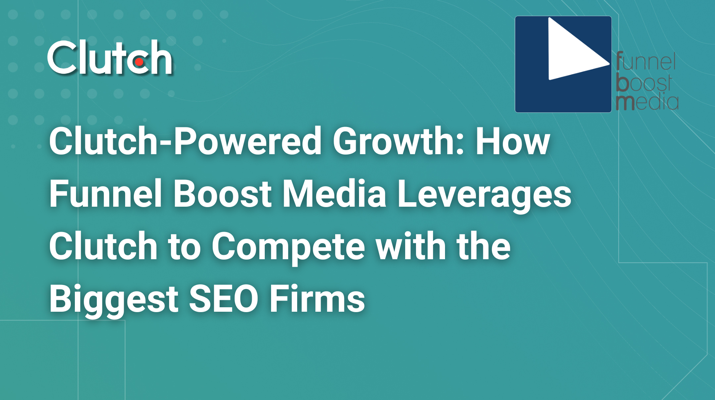

Updated January 2, 2025

Clutch spoke with Doug Reader and Mike Rosa of 180fusion as part of a series of interviews on how to hire an SEO company.
Looking for a SEO agency?
Compare our list of top SEO companies near you
Learn more about 180fusion on their Clutch profile or at 180fusion.com.
Please begin by introducing your company and your roles there.
MIKE: I am Mike Rosa, director of marketing here at 180fusion. We also have Doug Reader here, our director of SEO.
180fusion is a digital marketing agency specializing in SEO and paid search. We’ve in the business for more than five years. In that time, we’ve gone from a basement startup to the Inc. 500, experiencing tremendous growth and getting great results for our clients.
What goals should a business define before looking to hire a SEO partner?
Pin down specific products or services where you want to grow revenue
DOUG: First, what type of revenue growth do you want to experience? Break it down by service or product. Most businesses, at least in our experience, say, “I want to grow my business ‘x’ percent over the next few months or next few years”, but they don’t really drill down and get specific into where that growth is actually occurring.
For example, say we’re talking about an ecommerce business, it’s important for that business to clearly identify which product, products, or even product categories they’re going to experience their growth from, especially if they’re selling over a hundred different products. It’s great to say, “I want to have 20 percent growth,” but from our point of view, it’s more important to clearly identify where that growth is actually happening and which products and services are driving the growth.
For a service-based business, let’s say you’re a plumber and you work both on the commercial and residential side. It’s first important to identify, do you want more of your growth coming from commercial or residential? Then breaking it down even further, say you want to increase revenue through the residential side, what type of services are we talking about? Are we talking about fixing leaky pipes? Installing new plumbing throughout the house? Getting really granular is an important step in determining how you want to grow your revenue. So that would be my first goal, revenue growth by product or service.
Determine amount of additional traffic needed by studying conversion rates
Next, how many conversions do you want to have by month, by quarter, and by year? It’s important to write that down. Let’s say I’ve got a site or I’ve got a business, and I need to convert a thousand of whatever it is – selling a thousand products or getting a thousand forms filled out – I’ll need to break it down and understand where those conversions are coming from by channel.
Say we want our SEO efforts to make up 10% or 20%, we want Pay-Per-Click [PPC] to make up another percent, social to make up a percent, and a radio spot to make up a percent. Clearly identify which channels are producing what quantity of conversions. It’s really important to understand what the other channels are producing and what should be expected from SEO.
The next piece of that is understanding how each channel converts. Knowing that I want 20% of my total conversions to come from SEO, what is my actual conversion rate? Let’s say I’m converting organic visitors to my site at a rate of 1.5%, that’s good, because now I can work backwards and say, “In order to hit ‘x’ amount of conversions at this conversion rate, this is how many visitors I need to generate in this particular timeframe.”
The third piece of this is, now I can determine how many visitors I need to drive to each channel, because I understand how many conversions need to come to it and what percentage I’m converting at.
So to recap, first you determine the revenue growth in a product or service, which then turns into, how many conversions do I need for that product or service through each channel? Then through each channel, and based off of what percentage I’m guessing I’m going to be converting, how many visitors or how much traffic do I need to generate through each channel?
By answering these questions, any business can now have a roadmap, and they can create really clear milestones of where they currently are and where they want to be. It’s probably most important to why a client or a firm should clearly identify goals. I know from the SEO point of view, it really helps us put together a solid strategy and provide an accurate quote because we understand what they’re expecting on their end, and we have a better idea of what work actually has to be done to hit those targets.
Focus on traffic and conversions - Don't get hung up on specific keywords
MIKE: We on-board a lot of clients that have very specific goals with regard to ranking particular keywords. We also have clients that approach from a different perspective of wanting to generate a certain amount of traffic growth, and then even the more sophisticated ones trying to ballpark what their revenue growth will be.
If you ask an SEO company to rank you for certain keywords, and they do that but the traffic doesn’t come, in a lot of cases, it’s probably an issue of mistaken priority that’s led to the downfall of the campaign. So, defining what your real goals are, rather than what some people would propose as goals, is very important. Ideally, at the end of the day, your best outcome in SEO is going to be goals that are based upon increases in traffic and associated increases in conversions.
We use different tools to project how much traffic we can get if we can rank certain keywords, but at the end of the day, that’s all guesswork, and it’s very hard to tell if those keywords will send traffic to us that converts. If you work with an SEO company and give them the flexibility to optimize your on-site and off-site SEO for keywords that will send traffic – hopefully transactional traffic – that’s more likely to be able to substantiate your investment and generate significant return on that investment, rather than seeking after specific keywords.
In your opinion, which factors should be the weighted most heavily when hiring a SEO company?
DOUG: In order of importance, first off is proven performance. An agency should have ample case studies and examples to show prospects of work that they’ve done and successes they’ve been able to deliver to their clients.
The second piece I would say is transparency in work being done. That’s one thing this industry still has an issue with at times, depending on which agency you go to. I believe strongly that transparency and knowing where each dollar you’re spending is going is really important for the client.
The third item would be focus; essentially, whether the company specializes in the type of work you’re requiring, whether it’s SEO, PPC, or something else.
Fourth would be company attributes. Fifth is proactiveness. Something that we really strive to do here at 180fusion is to be proactive in driving the strategy. We’re actively looking for opportunities to improve their campaign beyond what we’re doing month over month. We have meaningful conversations with the client to get a better understanding of, how can we be doing more for you, and what other opportunities are available to really step up your game and have your business stand out online?
The last piece I’ve got here is price. While price is important, I would say proven performance, transparency, focus, company attributes, and proactiveness are more important from my point of view. Price would definitely be towards the bottom of that list.
What are some red flags to watch out for when evaluating a SEO company?
DOUG: First one is lack of experience. A lot of new firms are popping up all the time, and I would say it’s important to establish yourself with an agency that has been in the industry for some time and that has proven themselves. As you know, Google is making updates all the time, and it takes an agency that has the proper experience and the right talent to make it through those bumps.
The second one would be lack of transparency around work being done. I think it’s really important upfront during the sales process to get a clear understanding of what you can expect as the client throughout the life of the campaign. What type of reporting are you going to be getting, what type of deliverables, what type of transparency is going to be provided to you, in the sense of knowing where each dollar is going? Those are the two red flags that really stand out to me that come up often.
MIKE: To add to that, other red flags to look out for would be anyone that promises you pie in the sky results, especially in unreasonable or unattainable timeframes. SEO is a medium to long-term strategy. Most of the time, our clients require anywhere from six to eighteen months for most of the rankings to mature. Anyone who promises you, “I can get you ranked for such and such keyword in 30 days,” chances are, one, they’re overselling and they won’t be able to deliver on the promise, or two, they’re using methods that will ultimately get you penalized or get you in trouble, either in the near term or with the rollout of the next algorithm update.
Finding a company that believes in sustainable SEO practices is very important. At 180fusion, we try to focus on making SEO as future-proof as possible by doing it the right way. In a similar way that the medical industry has the Hippocratic Oath to "do no harm", we really believe that our SEO work shouldn’t pose any sort of risk or do any sort of harm to our clients’ sites. Finding somebody who believes in doing SEO the right way, the sustainable way, even if it’s sometimes the slightly slower way, is your safe bet in the long term. That’s the way to make sure that the rug isn’t pulled out from under you and you’re left with a mess for another SEO company to come in, where you’ll have to spend twice the money and twice the time to clean up the mistakes of the first.
Does 180fusion have any specific requirements for a potential client, such as a minimum budget or project length?
DOUG: We don’t have a minimum budget or minimum project length.
During the sales process, we perform due diligence on our end to get a clear understanding of where they have been. To build on what Mike just brought up, we’ve worked with a lot of clients who’ve come from other agencies, and those agencies used tactics that might have produced great results at the time, but long-term, they’re negatively impacting the site’s ability to perform well in Google or in other search engines.
We take the time to first go through, understand what has been done in the past, and based off of that, we’ll build out a strategy around what their goals are and anything that needs to be cleaned up. Then we provide the client with a long-term strategy and an appropriate budget to match that.
It’s incredibly rare that we’ve ever turned down a client. We are as transparent as possible, so the client understands what was done in the past, and this is what we have to do to clean up some of that mess, if there is a mess. Then, this is what we’re doing going forward to solidify their position and improve where they’re currently at.
MIKE: In terms of our SEO offering, we’ve really segmented it to be able to service the entire market, depending on their various needs. We serve anyone from your local mom-and-pop shops all the way up to Fortune 500 companies, and we have different levels of engagement for each of those needs.
We have a special competency in local SEO. We’re very good at being able to achieve local rankings. Not that we’re any less competent on enterprise, but the local offering has always been a core of what 180fusion has been about, which is being able to help small and medium-sized businesses grow into medium and large-sized businesses. That’s something that’s near and dear to our hearts.
That being said, our enterprise-level offerings are comprehensive, and we do work with Fortune 500 companies to act as an extension of their in-house team, to consult on things that need to be changed, or even in a full service management capacity.
We’ve stratified our offering to be able to meet all segments of the market. We have a best-in-class offering at each segment.
What unique value does 180fusion provide compared to others?
DOUG: Again, first off is transparency. We try to be as transparent as we can with each of our clients in terms of where each dollar is going, the work that we’re doing, and the work that we’re slated to do a month or two months down the road.
Second, as you know in this industry, there are a lot of different case studies and different tests that people run and they share their findings with the industry. While all that information is good, everyone else is also using that information.
So what we do internally is, we run our own tests to confirm whether some of these findings that other people are coming across a fluke, or if it that’s actually how it’s happening. We run tests that no one else is talking about at the time to provide more of a cutting-edge solution. We want to be ahead of the curve, not necessarily moving with the curve. We found that running our own internal tests help us stay ahead of a lot of the other agencies in our space.
Third, we provide custom strategies for our clients. At the onset of a new campaign, we spend the time digging in and understanding where they are at. No two sites are in the same place. It’s important that each site has a strategy tailored to their particular business and industry. We provide custom strategies for each of our clients, not cookie-cutter solutions.
MIKE: We believe that as much as possible our SEO should be future-proof, and for that reason we only employ very safe SEO tactics in order to achieve our end result. A lot of other agencies, when Google updates their algorithm, have a massive exodus of clients, because whatever tactics they were employing caused a wide swath of their clients to lose rankings all at the same time. They have to go running and scrambling every time Google updates its algorithm.
We’ve had the unique experience of actually having a lot of our clients’ rankings improve with rankings updates because we try to stay out ahead of what the trends are, and we listen to the warnings and adjust our strategy before they’re enacted. As an example, with the mobile responsiveness, Google hasn’t really started enforcing that yet, but it’s definitely a part of what we’re doing to make sure that when the day comes that Google takes a hardline stance on it, our clients aren’t left holding the bag. That sustainability is something that’s really important to us and is definitely one of our largest priorities. It’s enabled us to get great results for clients year after year.


